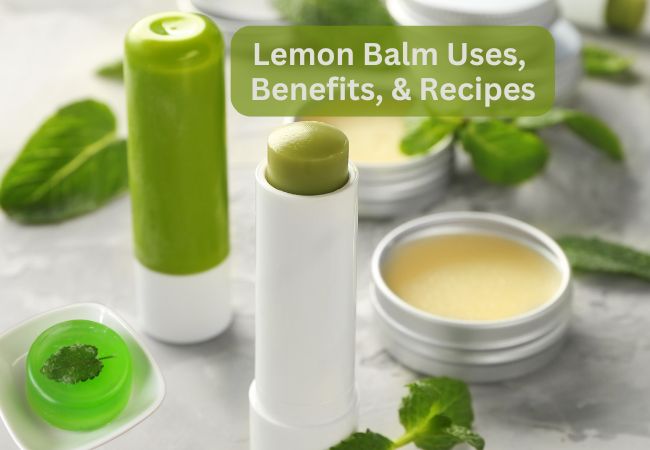Here are all the lemon balm uses, benefits, and recipes in skincare that you can try. Lemon balm is an easy-to-grow fragrant herb native to the Mediterranean region.
Lemon Balm Uses and Benefits
Lemon balm is one of the herbs I use from time to time in my DIY skin care products.
With a history dating back thousands of years, lemon balm has been cherished for its medicinal properties and aromatic qualities.
In this post, I will delve into the world of lemon balm and its remarkable benefits for skincare.
Understanding Lemon Balm
Lemon balm is a member of the mint family, characterized by its vibrant green leaves and a citrusy scent reminiscent of lemons.
Traditionally, lemon balm has been used to alleviate anxiety, promote relaxation, and support digestion. Its use in skincare can be traced back to ancient civilizations, where it was prized for its ability to soothe and heal the skin.
The chemical composition of lemon balm includes key compounds such as rosmarinic acid, flavonoids, and phenolic acids, which contribute to its therapeutic properties.
Rosmarinic acid, in particular, exhibits antioxidant and anti-inflammatory effects, making lemon balm a valuable ingredient in skincare formulations.
Benefits of Lemon Balm for Skin
Antioxidant Properties: Lemon balm contains potent antioxidants that help protect the skin from oxidative stress caused by free radicals.
By neutralizing free radicals, lemon balm helps prevent premature aging and maintain skin health.
Anti-inflammatory Effects: The anti-inflammatory properties of lemon balm make it effective in soothing irritated or inflamed skin.
Whether dealing with sunburn, rashes, or inflammatory skin conditions like eczema and psoriasis, lemon balm can provide relief and promote healing.
Antimicrobial Properties: Lemon balm possesses antimicrobial properties that make it beneficial for combating bacteria and fungi on the skin’s surface.
This makes it particularly useful for individuals with acne-prone or blemish-prone skin, as it can help prevent breakouts and promote clearer skin.
Skin-Calming Effects: Beyond its physical benefits, lemon balm also has calming effects on the skin and the mind.
Its gentle fragrance and soothing properties make it ideal for promoting relaxation and reducing stress-related skin issues.
Lemon Balm in Skincare Products
In recent years, the popularity of natural skincare products has surged, leading to an increased interest in botanical ingredients like lemon balm.
Today, you can find lemon balm featured in a variety of skincare formulations, including creams, lotions, serums, and masks.
These products harness the power of lemon balm to deliver targeted benefits for different skin types and concerns.
When selecting lemon balm-infused skincare products, it’s essential to consider factors such as the concentration of lemon balm extract.
You should also check what are the other active ingredients included in the formulation, and any potential allergens or sensitizing agents. Look for products that prioritize quality and efficacy to ensure optimal results for your skin.
DIY Lemon Balm Skincare Recipes
For those who prefer a hands-on approach to skincare, creating homemade lemon balm skincare products allows for customization and control over ingredients. Here are a few simple recipes to try:
Lemon Balm Facial Toner: Combine freshly brewed lemon balm tea with witch hazel and a few drops of essential oil (such as lavender or tea tree) for a refreshing toner that helps balance the skin’s pH and tighten pores.
Lemon Balm Face Mask: Blend fresh lemon balm leaves with yogurt, honey, and a splash of lemon juice to create a nourishing face mask that revitalizes and brightens dull skin.
Lemon Balm Infused Oil: Infuse dried lemon balm leaves in a carrier oil like jojoba or sweet almond oil for several weeks to create a versatile oil that can be used as a moisturizer, massage oil, or as a base for homemade skincare formulations.
Lemon Balm Body Scrub: Mix finely ground oats with lemon balm-infused oil, honey, and a dash of sea salt for an exfoliating body scrub that buffs away dead skin cells and leaves the skin soft and smooth. Check out these 10 DIY body scrub recipes.
Tips for Using Lemon Balm in Skincare
Before incorporating lemon balm into your skincare routine, it’s essential to perform a patch test to check for any adverse reactions, especially if you have sensitive skin or allergies.
Additionally, consider the shelf life of homemade skincare products and store them in a cool, dark place to prolong their efficacy.
When using lemon balm-infused skincare products, consistency is key. Incorporate them into your daily skincare routine to experience the full benefits over time.
And remember, while lemon balm can be a valuable addition to your skincare arsenal, it’s essential to maintain a holistic approach to skincare that includes proper hydration, sun protection, and a healthy lifestyle.
Final Thoughts
Lemon balm is a versatile herb in skincare, thanks to its antioxidant, anti-inflammatory, and antimicrobial properties.
Whether incorporated into commercial skincare products or used in DIY recipes, lemon balm offers a natural and effective solution for promoting healthy, radiant skin.
I hope this post on lemon balm uses and benefits was helpful. Subscribe to our newsletter to receive more skincare posts. Also, save the pin below and follow us @beautythings on Pinterest.









